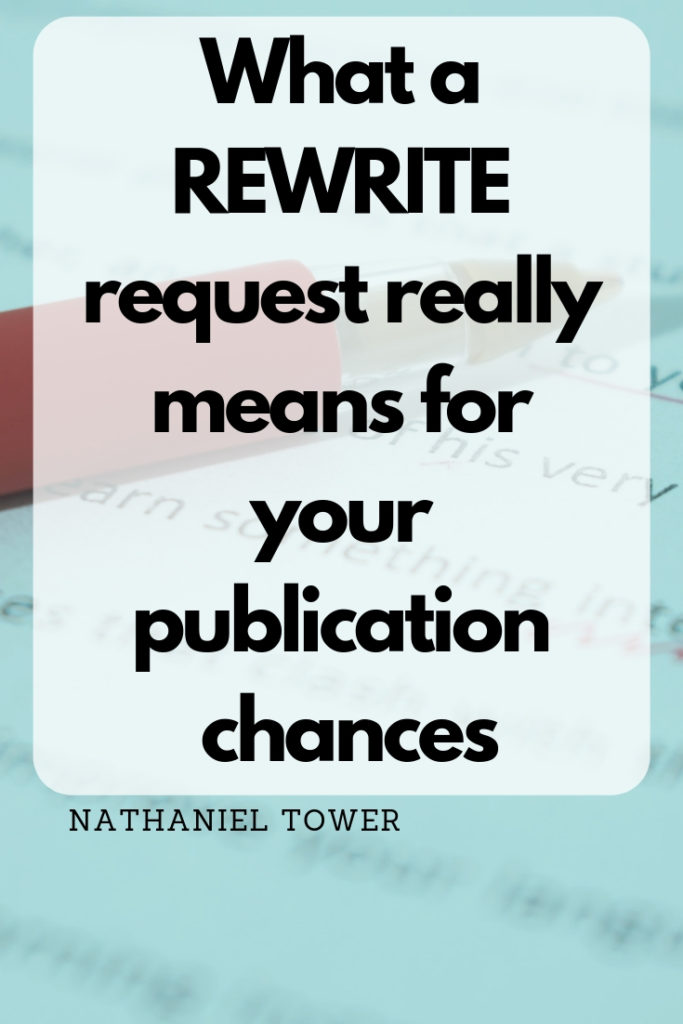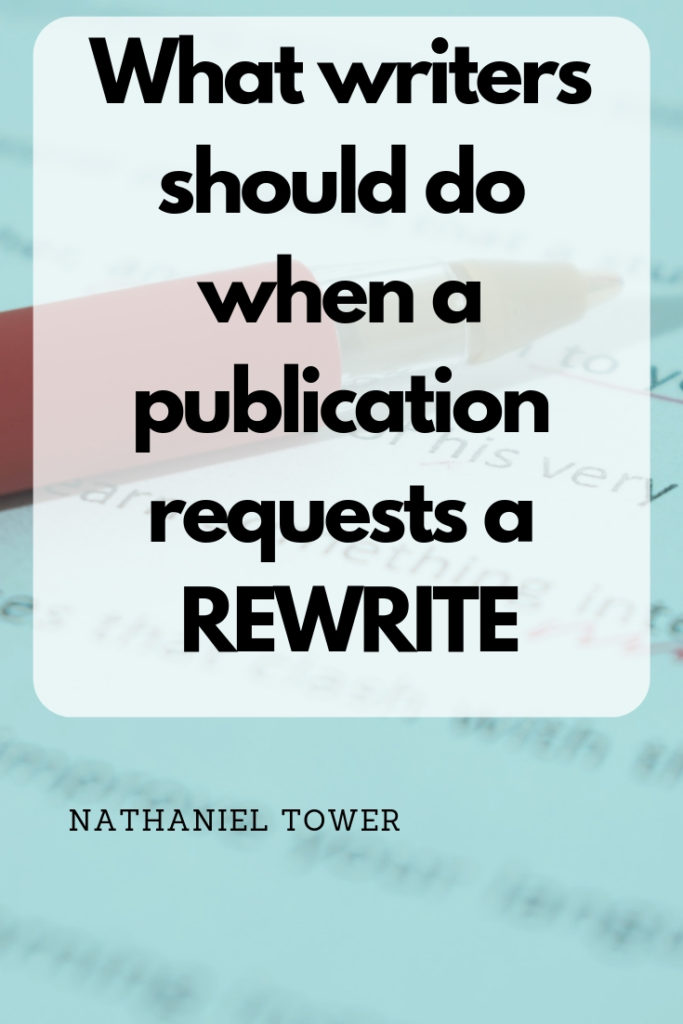Last Updated on April 7, 2019 by Nathaniel Tower
When a publication rejects your work, it’s pretty final. They are telling you, “We don’t want this.” When they accept your work, it’s also pretty final (or at least it should be). It’s their way of saying, “We really like this and want to share it with the world.”
But sometimes you get something in between: a rewrite request.
What is a rewrite request?
A rewrite request is exactly what it sounds like. A publication asks you to rewrite a story or poem and submit it again. It’s not an outright rejection, but it definitely isn’t an acceptance either.
A rewrite request typically happens when a publication really likes some aspect of your story but doesn’t feel like it works as a whole. Ultimately, they see a lot of potential in the piece and believe you can make it right for them. This is not the same as when a publication accepts your work and then sends back a bunch of edits. This is asking you to rewrite the piece before they will give you a final decision.
A rewrite request shouldn’t be viewed as an acceptance or a rejection, but it is actually closer to the latter. In other words, the publication is telling you, “We like this piece, but not enough to publish it as is. Make it better, and we will gladly take another look.”
Types of rewrite requests
There are three basic rewrite requests:
- The publication gives very specific feedback on what to do next. Specific feedback will tell you exactly what you need to do in your next draft. This will include very specific things about characters, scenes, the plot, and maybe even feedback at the sentence level.
- The publication gives general recommendations for how to fix it. This could include things like:
- Develop the characters more, particularly Johnny So & So.
- It drags in the middle. Cut out about 250-500 words.
- The publication doesn’t give much direction, just that they want you to make it better. This might include vague suggestions like:
- Make it more engaging.
- It doesn’t quite fit our aesthetic. Make it align with what we publish.
In rare cases, you might even get a rewrite request that says an editor will be following up with more specific feedback in the form of a marked-up copy of your story with recommendations. When this happens, the publication typically will ask first if you even want to rewrite the story. They aren’t going to go through all this effort for your story if you don’t want to change it.
A rewrite request is not a guarantee
Options 1 and 2 from above are much more likely to lead to an acceptance, but keep in mind that a rewrite request is never a guarantee. You may do exactly what the publication requests and still end up with a rejection in the end.
As a publisher, I would estimate we accepted about 75% of rewrites. The times we didn’t accept a rewrite, it was typically because the writer just hadn’t put in enough effort to make it clear this was a new and better story. Since we were usually very specific with our rewrite demands, anything that didn’t get accepted was on the writer. If any writer followed our directions, they would have gotten an acceptance.
As a writer, I’ve also had about 75% of my rewrites accepted for publication. Again, when I get specific feedback and address each issue, the story gets accepted. My rewrite rejections have typically been the result of very generic feedback that I just couldn’t sort out in the revision.
I did once have a rewrite rejected on the grounds that I did everything they asked but it just didn’t resonate with them in the end. They had believed in the story, but once they saw their vision come to life, they realized it just didn’t work.
And that’s the nature of publishing. It’s a fickle beast.
What to do when you get a rewrite request
If you get a rewrite request, you should take it seriously. It’s unlikely that a publication is going to jerk you around and pretend they like your story. They aren’t going to ask you to edit something and send it back unless they really want to read it again.
There are two things you need to consider when you get a rewrite request:
- Do I want to rewrite this piece, or am I happy with it as it stands?
- Do I have enough direction in this rewrite request to make the right adjustments to get an acceptance?
If you get a rewrite request that has no direction, don’t be shy about asking for more specific feedback. If you get a rewrite request that has specific feedback you don’t think will work in the story, then feel free to say no. After all, this is your story. You don’t have to meet their demands. You don’t have to publish it in their magazine if they don’t believe in your vision.
You might be willing to rewrite a piece you really love to get into your dream publication. But I wouldn’t recommend changing a story you love for an unpaid acceptance in a small magazine with little readership.
How to turn a rewrite request into an acceptance
If you want to turn your rewrite request into an acceptance, it’s important you do the following:
- Address any feedback they’ve given you in the revision. This is true of both generic and specific feedback.
- Make sure that what you resubmit is a better story. It should feel like a different piece, but they should still recognize it. In other words, make sure you’ve revised it enough.
- When you resubmit, include a cover letter that addresses the changes you’ve made. If there is any feedback you didn’t apply, make sure you explain why you didn’t. Oh, and thank them for the opportunity to rewrite it.
If you do get a rewrite request and the publication works very closely with you on the story, don’t withdraw it after all the changes are made. I had this happen more than once at Bartleby Snopes. We spent hours working with writers to make their stories amazing, and in the end they withdrew the new versions and got them published elsewhere. That’s just being a jerk and will likely lead to you getting blacklisted from that particularly publication (and possibly others).
Overall, a rewrite request should be viewed as a great opportunity for you. It’s not a guarantee, but the odds are in your favor. Don’t waste this opportunity, but don’t take it unless you really want it.
How do you handle rewrite requests? Share your experiences in the comments. And don’t forget to share this post on all your favorite channels.


